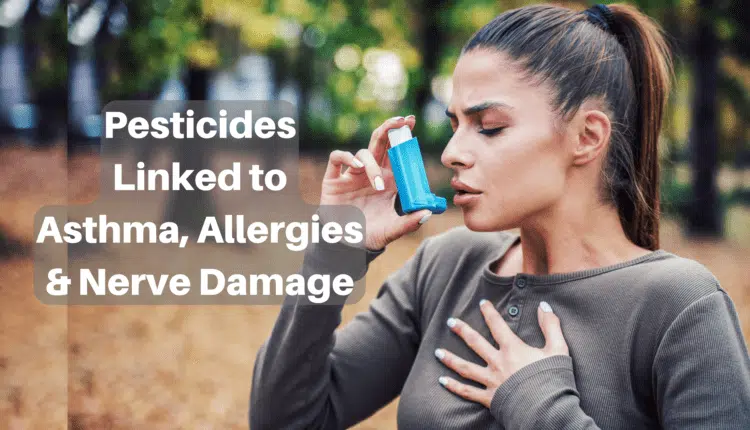PESTICIDES LINKED TO ASTHMA, ALLERGIES AND NERVE DAMAGE
One of the most insidious and harmful chemicals in our environment today is pesticides. Pesticides are chemicals that kill unwanted molds, rodents, insects and plants and are used in a variety of settings including homes and schools. Pesticides go by a variety of names like insecticides, herbicides, fungicides and bactericides. Anything that is designed to kill weeds, bugs, bacteria and fungus is a pesticide. This includes weed prevention, weed abatement, mosquito fogging, bug bombs, ant spray, mosquito spray, termicides, rodent control, flea and tick spray, lice treatments, bee and wasp spray, crop spraying etc.
If you suffer from asthma, allergies or experience some kind of nerve damage – you may be filled with unwanted pesticides from your immediate environment.
Are pesticides threatening our kids and future generations?
Increased pesticide exposure has been associated with poorer mental development, pervasive development disorder (autism), inattention and ADHD. One study concluded that on the basis of experimental and observational research, pesticides may be capable of inducing core features of autism while further data suggests a link between parental pesticide use and physical birth defects, low birth weight and fetal death.
A study of mothers living in California’s Central Valley found that kids born to moms who had been exposed to organochlorine insecticides, like DDT, dieldrin and heptachlor, applied within 500 meters of the home during days 26 and 81 of gestation were 7.6 time more likely to be diagnosed with autism. Furthermore, in 2012, Philip Landrigan MD and Director of Children’s Environmental Health Center (CEHC) listed organochlorine pesticides as one of the ’top 10 environmental contributors suspected to contribute to autism’.
Pesticides and Children
Children are particularly susceptible to the hazards associated with pesticide use. There is now considerable scientific evidence that the human brain is not fully formed until the age of 12, and childhood exposure to some of the most common pesticides on the market may greatly impact the development of the central nervous system. Children have more skin surface for their size than adults, absorb proportionally greater amounts of many substances through their lungs and intestinal tracts, and take in more air, food and water per pound than adults. Children have not developed their immune systems, nervous systems, or detoxifying mechanisms completely, leaving them less capable of fighting the introduction of toxic pesticides into their systems.
Many of the activities that children engage in – playing in the grass, putting objects into their mouth and even playing on carpet – increase their exposure to toxic pesticides. The combination of likely increased exposure to pesticides and lack of bodily development to combat the toxic effects of pesticides means that children are suffering disproportionately from their impacts.
Allergies and Asthma linked to pesticide exposure
The CDC found an 18% rise over a 10 year period in food allergies and allergist Elina Jerschow, MD states there is a connection between pesticides and this increase.
Researchers from Spain state that many pesticides are capable of directly damaging the bronchial mucosa and may increase the risk of developing asthma, exacerbate the condition in those who already have asthma and can trigger asthma attacks. A U.S. study found that pesticide sprays double the risk of developing asthma.
Food Allergies and Pesticides
People exposed to higher levels of certain weed-killing chemicals may also be more likely to develop food allergies, a new study shows.
The chemicals are called dichlorophenols (DCPs). They are created by the breakdown of common pesticides, including chlorinated chemicals used to purify drinking water. They also turn up in moth balls, air fresheners, deodorizer cakes in urinals, and certain herbicides sprayed on crops.
“They’re quite common,” says researcher Elina Jerschow, MD, an allergist at Montefiore Medical Center in the Bronx, N.Y.
Rates of food allergies are rising in the U.S, which researchers believe is directly correlated to the overuse of pesticides. A 2008 study by the CDC (Center for Disease Control) found an 18% jump from 1997 to 2007.
Data collected by the National Health and Nutrition Examination Survey (NHANES) compared levels of pesticides and other chemicals in the urine of 2,211 in the study. Most participants had detectable levels of DCPs in their urine and more than half showed sensitivity to at least one food, like peanuts, eggs or milk and also to environmental allergens like ragweed or pet dander. People in the study with the highest levels of dichlorophenols had the greatest food sensitivities.
Pesticides Are Poisonous To Nerves (neurotoxic)
Pesticides were originally designed as nerve gasses for chemical warfare. They were designed to kill living things and when it was discovered that they worked so well in killing people they decided to use them in smaller doses to kill weeds, insects etc.
The chief target organ of pesticides is the brain because pesticides seek out lipids (fats), which the brain is abundant in. Also, pesticides inhibit the enzyme acetylcholinesterase. Acetylcholine is the major neurotransmitter in the brain and what Dr. Sherry Rogers calls our primary happy hormone. It is the basic chemical that makes the brain, all the nerves and the muscles work. Pesticides disrupt this hormone. Acetylcholine also controls our fight or flight response, also known as the stress response system. When pesticides inhibit acetylcholinesterase, then high levels of acetylcholine build up and trigger the body to remain in the fight or flight state. This causes the continuous release of norepinephrine, adrenalin and cortisol, which among other things causes high levels of anxiety, increase heart rate, nervousness, insomnia, irritability and can ultimately cause burn out of the adrenal glands.
They also inhibit the conversion of tryptophan into serotonin, our natural antidepressant, which leads to insufficient levels of serotonin and ultimately depression.
Several studies in the last year have found that pesticides increase your risk of developing Parkinson’s significantly. At the University of California, their study found that a pesticide called maneb increases your risk of developing Parkinson’s by 75 percent. When more than 90,000 licensed pesticide applicators and their spouses were followed closely, their risk of developing Parkinson’s was found to be 2.5 times higher, and a study in the Archives of Neurology found that you’re twice as likely to develop Parkinson’s if you use pesticides.
What can I do to reduce my exposure to pesticides?
Buying organic foods and using a water filtration system that removes pesticides is a wonderful start. Not using pesticides in your own garden or to rid your yard of bugs is another improvement. You must also be sure to check with your child’s school to find out what days that are spraying and what they are spraying for – because this could be the potential trigger for your child’s allergies or asthma.
Sourced through Scoop.it from: www.naturalhealth365.com
PESTICIDE EXPOSURE LINKED TO MANY CHRONIC ILLNESSES
There is a huge concern amongst scientists and doctors over the health impacts of the wide use of pesticides in the world. Most people are not even aware that they are exposed to these toxic substances on a daily basis and have no concept of the very harmful consequences they have on our health. Pesticides are found in almost every public place, such as the grocery store, schools, office buildings, hospitals, banks, golf courses, neighbor’s yard, highways, parks, on your food and often in your own house.
There is a huge body of evidence on the relation between pesticide exposure and the following chronic diseases and conditions:
- Cancers (varying types)
- Diabetes
- Parkinsons
- Alzheimer
- ALS
- Asthma
- COPD
- Atherosclerosis (plaquing of arteries)
- Coronary Artery Disease
- Kidney disease
- Lupus
- Rheumatoid Arthritis
- Chronic Fatigue Syndrome
- Hashimoto disease
- Hypothyroidism
- Endometriosis
- Birth defects
- Infertility
- Depression
- Anxiety
According to the World Health Organization between 1 million and 25 million people suffer with pesticide poisoning each year. It is estimated that as many as 20,000 people in the US will develop cancer each year from the residue of pesticide on their food.
Steps To Reduce Your Exposure To Pesticides And Herbicides.Eat ORGANIC (conventionally farmed fruits and vegetables have high concentrations of pesticides both externally and internally within the meat of the fruit or vegetable.
- Do Not Use ANY Pesticides in your home or your yard. Use non-toxic and healthy alternatives for ants, weeds etc.
- Take your shoes off before entering your house. This is extremely important, because shoes pick up pesticides everywhere they go. When you track them into the house, their potency increases and they are more toxic than when they were originally applied.
- Avoid places where you know they spray. Golf courses are especially toxic.
- Do not live in an agriculture/farm area.
It’s important to understand that any chemical that is designed to kill a living creature or plant, regardless of how small it is, will be harmful to all living things. It’s just common sense, so no matter what your government, TV commercials, neighbors etc., tell you, There is no safe level of pesticide.
If your suffering from neuropathy, set up a consult by visiting:
Click Here to Schedule a Consult
Or call the San Antonio Neuropathy Center (844) 400-0101
This blog has been provided by Dr. John Coppola, D.C. and Dr. Valerie Monteiro, D.C. Dr. Coppola and Dr. Monteiro are the founders of the San Antonio Neuropathy Center, and Precision Sport & Spine. They are the leading experts in the field of neuropathy and specifically drug free nerve repair. They are the authors of the critically acclaimed book “Defeat Neuropathy Now …. In Spite of Your Doctor. The doctors have over 25 years of clinical experience.
If you would like to reach the doctors regarding a specific health problem, you may email them at [email protected]


